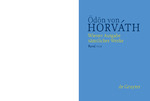Ödön von Horváth, Ein Sklavenball/ Pompej, Band 2
| dc.contributor.author | Vejvar, Martin | |
| dc.date.accessioned | 2016-12-31 23:55:55 | |
| dc.date.accessioned | 2019-05-11 03:00:52 | |
| dc.date.accessioned | 2020-04-01T14:19:17Z | |
| dc.date.available | 2020-04-01T14:19:17Z | |
| dc.date.issued | 2015-11 | |
| dc.identifier | 604871 | |
| dc.identifier | OCN: 1030820013 | en_US |
| dc.identifier.uri | http://library.oapen.org/handle/20.500.12657/32804 | |
| dc.description.abstract | The farce Ein Sklavenball mit Gesang und Tanz [A Slave Ball with song and dance] and the comedy that was developed out of it Pompeji [Pompei] (both 1937) are the last two dramas completed by Ödön von Horváth. The present edition is the first to cover the immense wealth of source material on the genesis of both works. In addition, this edition puts especial emphasis on the intertextual traces left by Horváth’s reading of the comedies of the Roman poet T. M. Plautus. | |
| dc.language | German | |
| dc.subject.other | Ödön von Horváth | |
| dc.subject.other | critical edition | |
| dc.subject.other | genetic textual criticism | |
| dc.subject.other | Austrian Literature 1918-1938 | |
| dc.subject.other | Ödön von Horváth | |
| dc.subject.other | historisch-kritische Edition | |
| dc.subject.other | Textgenese | |
| dc.subject.other | Österreichische Literatur 1918-1938 | |
| dc.subject.other | Gott | |
| dc.subject.other | Papier | |
| dc.subject.other | Parasitismus | |
| dc.subject.other | Plautus | |
| dc.subject.other | Pompeji | |
| dc.subject.other | Praetur | |
| dc.subject.other | Sklavenhandel | |
| dc.subject.other | Sklaverei | |
| dc.title | Ödön von Horváth, Ein Sklavenball/ Pompej, Band 2 | |
| dc.type | book | |
| oapen.abstract.otherlanguage | Die Posse Ein Sklavenball und die daraus entwickelte Komödie Pompeji (1937) sind die beiden letzten vollendeten Dramen Ödön von Horváths. Die vorliegende Edition arbeitet erstmals die immense Fülle an werkgenetischem Material zu beiden Stücken auf. Darüber hinaus legt sie einen besonderen Schwerpunkt auf die intertextuellen Spuren, die Horváths Lektüre der Komödien des römischen Dichters T. M. Plautus hinterlassen hat. | |
| oapen.identifier.doi | 10.1515/9783110436730 | |
| oapen.relation.isPublishedBy | e1130a34-48fd-42ed-9a8d-f179b9c3361f | |
| oapen.relation.isFundedBy | 26ae1657-c58f-4f1d-a392-585ee75c293e | |
| oapen.relation.isbn | 9783110436730 | |
| oapen.collection | Austrian Science Fund (FWF) | |
| oapen.pages | 510 | |
| oapen.grant.number | PUB 224 | |
| oapen.remark.public | Relevant Wikipedia pages: Gott - https://de.wikipedia.org/wiki/Gott; Papier - https://de.wikipedia.org/wiki/Papier; Parasitismus - https://de.wikipedia.org/wiki/Parasitismus; Plautus - https://de.wikipedia.org/wiki/Plautus; Pompeji - https://de.wikipedia.org/wiki/Pompeji; Praetur - https://de.wikipedia.org/wiki/Praetur; Sklavenhandel - https://de.wikipedia.org/wiki/Sklavenhandel; Sklaverei - https://de.wikipedia.org/wiki/Sklaverei | |
| oapen.identifier.ocn | 1030820013 |

